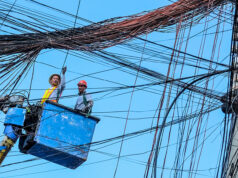No reversal in rice import policy, NEDA’s Pernia says
SOCIOECONOMIC Planning Secretary Ernesto M. Pernia said Tuesday that the government has no plans to halt rice imports as reversing this policy could cause a renewed spike in inflation.
On the sidelines of an event in Ortigas district yesterday, Mr. Pernia said that opening up the market to cheaper imported rice has helped the “bigger majority” of the population after inflation felt by low-income families eased to 0.9% in September.
If the Philippines stops importing cheaper rice, it could see the return of 2018’s inflation crisis.
“Well, we will be back to where we were last year and the poor will suffer. Inflation for the 30% poorest has come down to 0.9% (this year); the much bigger majority is benefitting,” he told reporters when asked about the negative impact of halting imports.
Inflation slowed further to 0.8% in October from the multi-year highs recorded last year. Year-to-date inflation is currently 2.6%, which falls within the central bank’s 2-4% target range.
The Rice Tariffication Law has been cited as one of the factors that helped ease inflation, with cheaper foreign grain also expanding supply.
Mr. Pernia however assured that the government has implemented several measures to “alleviate the difficulties of farmers,” including unconditional cash transfers and loans.
On Monday, the Department of Finance (DoF) said it will take a closer look at “possible distortions” in the rice market, citing the wide gap between the retail price of rice and the farmgate price paid to farmers. It estimated the gap at an average of P22 per kilogram.
Rice industry stakeholders have been pressing the government to repeal the Rice Tariffication Law to provide relief for farmers.
Meanwhile, Mr. Pernia also said he supports exploring other measures to address high sugar prices, as proposed by Finance Secretary Carlos G. Dominguez III.
Mr. Pernia said restructuring the sugar industry will be a “challenge” for the government, noting that there are “too many middlemen involved in the process.”
Mr. Dominguez, who had earlier proposed to liberalize sugar imports with rice tariffication as a model, last week proposed to increase the millers’ share of the sugar crop to provide them with more incentive to upgrade their equipment, thereby improving yields.
After the Senate issued a resolution opposing liberalized sugar imports, he proposed “a new kind of relationship between a mill and the planter” as an alternative.
Mr. Pernia said the liberalization of sugar imports can be resorted to “slowly” while considering other measures.
“We’ll try other steps first, if they succeed then there may be no need for a full-scale liberalization,” he said.
The DoF has cited the need to lower sugar prices in order to make the food industry more competitive. — Beatrice M. Laforga



